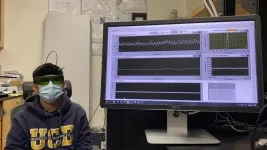(Press-News.org) Two-thirds of California prisoners who were offered a COVID-19 vaccine accepted at least one dose, according to a new study by researchers at the Stanford University School of Medicine.
"We found that many incarcerated people in California prisons were willing to be vaccinated for COVID-19," said Elizabeth Chin, the lead author of the study and a PhD candidate in biomedical data science. "This is an encouraging sign for other states at an early stage of rolling out vaccination programs in their prisons and jails."
The researchers also found that nearly half of those who initially turned down a COVID-19 vaccine accepted it when it was offered to them again. The finding is an important indication that vaccine hesitancy is not necessarily fixed.
Two-thirds of 97,779 incarcerated residents in the state's 35 prisons were offered vaccines and 66.5% of offerees accepted at least one dose, the researchers found, although uptake varied across different groups.
Acceptance was highest among Hispanic (72.6%) and white incarcerated people (72.1%); slightly lower among American Indian or Alaska Native and Asian or Pacific Islanders (67.7%); and substantially lower among Black incarcerated people (54.9%). Vaccine acceptance levels did not differ according to whether those offered had previously been infected with the coronavirus.
The study, conducted by members of the Stanford-CIDE Coronavirus Modeling Team based at Stanford Health Policy, was published May 12 in the New England Journal of Medicine.
"Prisons and jails are high-risk settings for COVID-19, with case and mortality rates far exceeding those in the general community," said Chin. "Achieving and maintaining sufficient population-level immunity to avoid large outbreaks will be challenging in carceral settings. High and equitable uptake of vaccination is crucial. Attaining it may depend on successful efforts to build trust and vaccine confidence, and regular re-offers to decliners."
Using data from the California Department of Corrections and Rehabilitation, the researchers tracked the vaccine rollout at California's 35 prisons, which incarcerate roughly 100,000 people. From Dec. 22, 2020, when vaccinations began, through March 4, 2021, two-thirds of the residents had received offers of the Pfizer or Moderna vaccines, and two-thirds of those who received offers accepted them.
Younger and healthier residents were less likely to accept vaccines than older and medically vulnerable residents, respectively. Black residents also had lower rates of acceptance than residents of other racial or ethnic groups.
"The disparities in acceptance, particularly along racial lines, are cause for concern," said David Studdert, LLB, ScD, MPH, a professor of medicine at Stanford Health Policy and of law at Stanford Law School. Studdert is the study's senior author. "But there is encouraging news here too. Nearly 80% of the most vulnerable residents accepted, which is close to what we have seen in nursing homes. And the surprisingly high rate of acceptance among people who initially passed on receiving the shot suggests re-offers should be a key component of these programs."
Jeremy Goldhaber-Fiebert, an associate professor of medicine and a study co-author, noted, "This is one of the largest state prison systems in the country, and if it can achieve high vaccination coverage among its incarcerated population, then the federal and other state prisons systems can and should do the same for the more than 2 million people that they currently incarcerate."
INFORMATION:
Other Stanford co-authors of the study include Tess Ryckman, a PhD candidate at Stanford Health Policy; Yiran Liu, a PhD candidate in cancer biology; Lea Prince, PhD, a social science researcher at Stanford Health Policy; Jason Andrews, MD, an associate professor of infectious diseases; and Joshua Salomon, PhD, a professor of medicine and senior fellow at the Freeman Spogli Institute for International Studies.
The study was supported by Stanford's COVID-19 Emergency Response Fund, established with a gift from The Horowitz Family Foundation, and grants from the National Institute on Drug Abuse, the Centers for Disease Control and Prevention (though the Council of State and Territorial Epidemiologists), the National Science Foundation, and the Open Society Foundations.
The Stanford University School of Medicine consistently ranks among the nation's top medical schools, integrating research, medical education, patient care and community service. For more news about the school, please visit http://med.stanford.edu/school.html. The medical school is part of Stanford Medicine, which includes Stanford Health Care and Stanford Children's Health. For information about all three, please visit http://med.stanford.edu.
Print media contact: Beth Duff-Brown at (650) 736-6064 (bethduff@stanford.edu)
Broadcast media contact: Margarita Gallardo at (650) 723-7897 (mjgallardo@stanford.edu)
The 1949 letter by the physicist and Nobel laureate discusses bees, birds and whether new physics principles could come from studying animal senses.
It's a position still being realised within physics to this day, with a growing body of research and understanding of how animals such as birds and bees find their way around.
Now a study led by RMIT University in Melbourne, Australia, discusses how recent discoveries in migratory birds back up Einstein's thinking 72 years ago.
The previously unpublished letter was shared with researchers by Judith Davys - Einstein had addressed ...
If you did not catch the flu this year -- and there is an overwhelming chance that you did not -- you have COVID-19 to thank.
It's a small consolation, given the enormously disruptive scope of the pandemic. But it's the focus of a new paper published in the journal Frontiers in Public Health by two Concordia researchers and their colleagues that studies the 2020 influenza figures from Canada, the United States, Australia and Brazil. The authors show there is a clear relationship between the implementation of COVID-mitigation measures such as hand-washing, masking and social distancing and the spread of the annual flu.
They write that these preventive measures all but eliminated ...
The quest to create safer, more successful pregnancies is one of the top goals of modern science. While pregnancy is better understood today than ever before, with improvements in technology helping to lower the risk of negative outcomes, there is much researchers still don't know about a vital part of the pregnancy process: uterine fluid.
Secreted by glands in the uterus during pregnancy, uterine fluid is believed to play an important role in supporting a developing embryo by sending information from the uterus to the embryo, along with a host ...
In 2020, stores sold out of garden seed, coops and rabbit cages. Now, we have an idea how much protein people can grow in their backyards.
The 2020 meat shortages led many to wonder what to eat for protein when supply chains are disrupted. Some people turned to gathering eggs, raising animals and growing their own food. A team from Michigan Technological University and the University of Alaska Fairbanks found that the work is well worth it. In a new study published in Sustainability, the researchers looked at how a typical household with a typical backyard can raise chickens, rabbits or soybeans to meet its protein needs.
People eat a lot of protein in the U.S. and the average person needs 51 grams of ...
MINNEAPOLIS/ST.PAUL (05/12/2021) -- In a study recently published in END ...
DURHAM, N.H.-- A national report from the University of New Hampshire shows close to one and a half million children each year visit a doctor, emergency room or medical facility as a result of an assault, abuse, crime or other form of violence. This is four times higher than previous estimates based only on data from U.S. emergency rooms for violence-related treatment.
In their END ...
A portable, rapid testing platform can detect gonorrhea infections in patient samples in under 15 minutes, far faster than standard-of-care tests that can take hours or days. The platform accurately detected infections and determined resistance to a common antibiotic in 217 patient samples from sexual health clinics in Baltimore and Uganda. The technology's speed and low cost could empower quicker and more affordable gonorrhea testing in low-resource regions, as well as help combat the spread of drug-resistant strains. Rates of gonorrhea and other sexually transmitted ...
A new, noninvasive method for measuring brain blood flow with light has been developed by biomedical engineers and neurologists at the University of California, Davis, and used to detect brain activation. The new method, functional interferometric diffusing wave spectroscopy, or fiDWS, promises to be cheaper than existing technology and could be used for assessing brain injuries, or in neuroscience research. The work is published May 12 in Science Advances.
"Now we can assess how well the brain regulates blood flow, and even detect brain activation noninvasively in adult humans, using principles similar to functional ...
MISSOULA - Only an anthropologist would treasure millennia-old human feces found in dry caves.
Just ask Dr. Meradeth Snow, a University of Montana researcher and co-chair of UM's Department of Anthropology. She is part of an international team, led by the Harvard Medical School-affiliated Joslin Diabetes Center, that used human "paleofeces" to discover that ancient people had far different microorganisms living in their guts than we do in modern times.
Snow said studying the gut microbes found in the ancient fecal material may offer clues to combat diseases like diabetes that afflict people living in today's industrialized societies.
"We ...
Researchers used genetic engineering tools to create a virus that can enter specific neurons and insert into the prefrontal cortex a new genetic code that induces the production of modified proteins. In tests with mice, the alteration of these proteins was sufficient to modify brain activity, indicating a potential biomarker for the diagnosis of psychiatric disorders such as schizophrenia and autism.
Sometimes referred to as the "executive brain", the prefrontal cortex is the region that governs higher-level cognitive functions and decision making. Studies of tissue from this brain region in patients with schizophrenia have detected alterations in two proteins: BDNF (brain-derived neurotrophic factor) and trkB (tyrosine receptor kinase B).
The relationship ...






